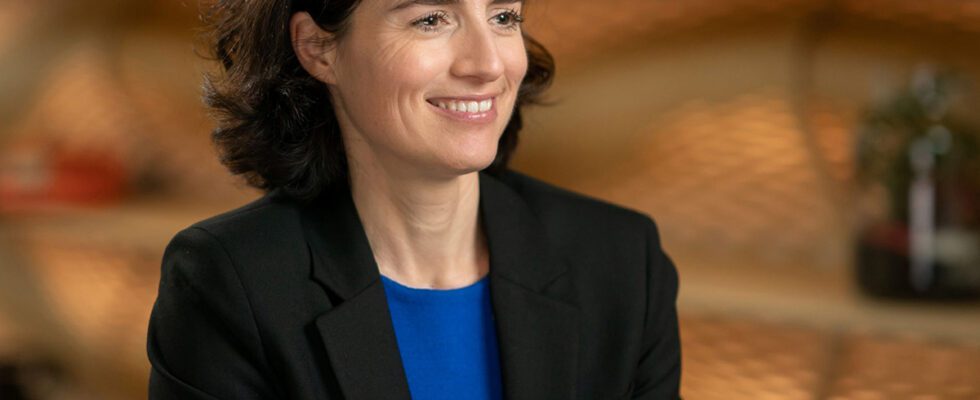First successful exercise for Christel Heydemann. In office since April 4, the new CEO of Orange presented this Thursday, February 16, financial results in line with the group’s objectives. The net income of the telecom operator has tripled, rising in one year from 778 million euros to nearly 2.62 billion euros.
Turnover for 2022 only increased by 0.6% to reach 43.47 billion euros. The Africa and Middle East zone (+6.4%) played the role of locomotive thanks to the increase in its 4G subscribers (53 million subscribers, or +19%).
In the other geographical areas, the results are more mixed. France, which remains the group’s main market, saw its turnover drop by 1.1% to reach 18 billion euros, despite the arrival of 339,000 new fiber subscribers last year.
European fiber leader
To “reconnect with the growth of its profitability no later than 2025”, the group presented its new strategic plan deemed “ambitious, but pragmatic”. Called “Lead the future”, it aims to refocus Orange on its core business and enhance its strengths.
Putting an end to the diversification policy initiated by the previous directors, Christel Heydemann has already completed the sale of OCS, the TV channel package.
Orange Bank, which accumulates losses, would also be in the line of fire. According Challengesthree French banks and an American fund would have placed their pawns.
fiber lens
Concentrating on its core business means for Orange pushing its advantage in fiber optics. With 46 million sockets deployed at the end of 2022, i.e. nearly a third of connections on the Old Continent, the French operator presents itself as the European leader in fiber.
As a response to the legal battle between it and Arcep, the operator intends to continue on this path with five million additional sockets in Europe, and two million in the Africa and Middle East region by 2025.
At the same time, he recalls that the peak of investments was reached last year. The investments made in the networks should increase from 18% of its turnover in 2022 to around 15% from 2023, then over the entire duration of the plan, i.e. until 2025.
A new satellite offer in 2023
At the same time, Orange intends to capitalize on its infrastructures. Unlike these competitors who sold their antennas and pylons to managers called TowerCo, the incumbent operator created its own TowerCo. Called Totem, it is showing good growth with revenue of 685 million euros in 2022, up 14.9%. This subsidiary will be “a central player in the consolidation of the sector in Europe”.
At the same time, the incumbent operator will continue its plan to rationalize its fixed and mobile networks towards very high speed with the decommissioning of the copper network in France – end of the marketing of ADSL offers in 2025 – and 2G and 3G in all European countries by 2030.
It is also about increasing the ARPU (Average Revenue Per User). In France, this average income per subscriber is among the lowest of westernized countries due to the hypercompetition experienced by the French market, with the unprecedented presence of four telecom operators.
The answer will come through innovation, according to Orange. During 2023, the group will launch a new satellite offer in partnership with Eutelsat. Thanks to the new Konnect VHTS satellite, according to the press release, it will make it possible to benefit from very high speed in the most isolated regions for the price of fiber optics.
OBS becomes Orange Business
Orange is betting on the future of Wi-Fi at home, with the arrival of Wi-Fi 7, expected for 2024, and on-demand networks on the business side. On the B to B side, its dedicated subsidiary Orange Business Services (OBS) is changing its name to simply become Orange Business.
In the business segment, Orange intends to take advantage of its unique positioning on the ESN (Digital Service Companies) market. Due to the group’s historical business – Orange Business is at the crossroads of telecoms and digital.
An asset at a time when these two worlds are converging. While companies are abandoning fixed telephony and private networks with the generalization of collaboration solutions in cloud mode, Orange intends to become “a network and digital integrator” by capitalizing on its expertise in the fields of connectivity, resilience and Security. Its portfolio of services is expected to be reduced to gain visibility.
Orange Cyberdefense
In the cybersecurity sector, Orange aims to become “a leader in Europe”, aiming for a turnover of 1.3 billion euros by 2025, against 838 million euros in 2021.
To this end, Orange Cyberdefense will pursue its strategy of targeted acquisitions – the company recently completed two acquisitions in Switzerland – while strengthening its position in the VSE and SME market.
The cyber subsidiary also intends to approach the private market.
Focus on the environment and human resources
To combat global warming, Orange also plans to reduce CO2 emissions on scopes 1 and 2 by more than 30% by 2025 (2015 base) and to reduce its emissions on scopes 1, 2 and 3 by 45%. by 2030 (base 2020) – the last scope referring to supplier emissions.
In terms of HR, a sensitive subject since the series of suicides experienced by the group in the late 2000s, Orange says it wants to invest in training and forward-looking skills management. Objective: to develop its employees towards the new professions of data, the cloud, cybersecurity or artificial intelligence.
The publication of the financial results and the announcement of the strategic plan were welcomed by the market. The Orange share price rose on the stock market by nearly 6% at 12 p.m. Paris time.
